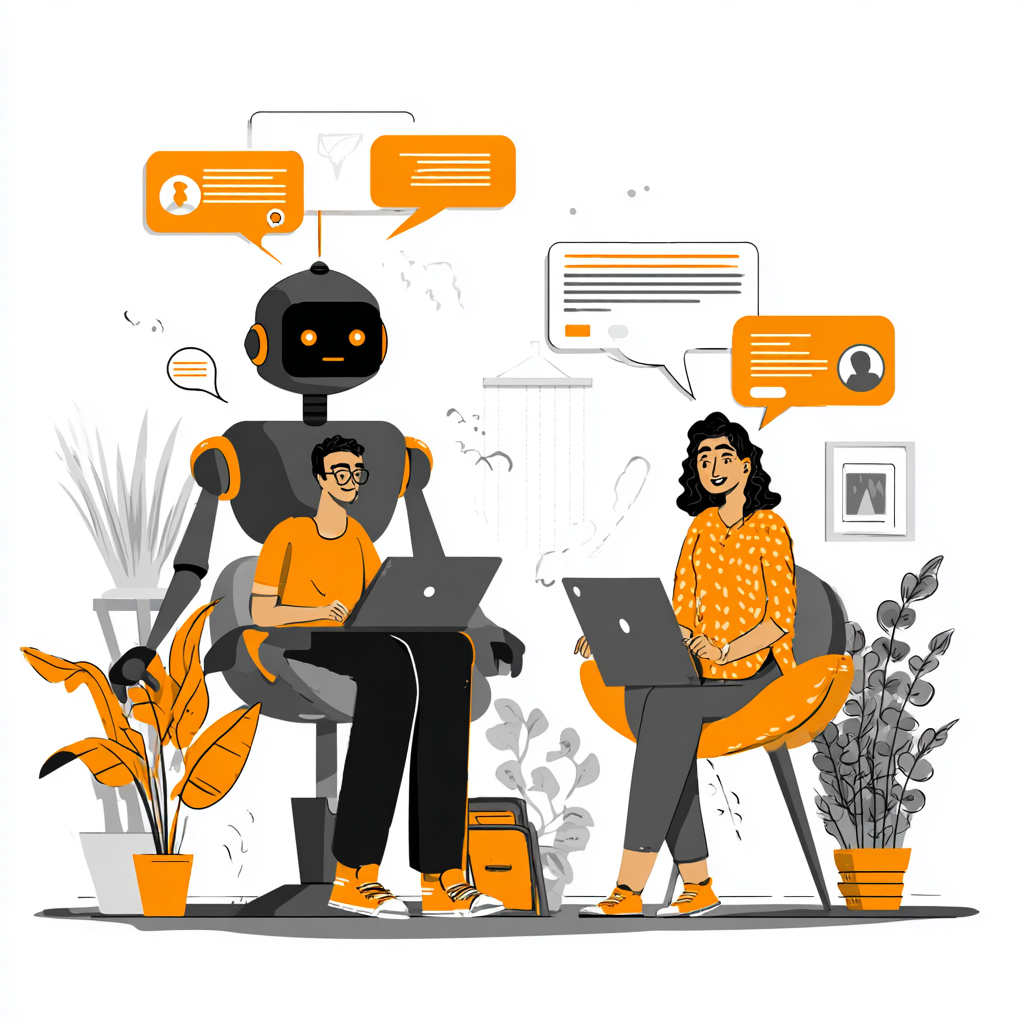
In today’s fast-paced digital world, customers expect instant responses, personalized interactions, and seamless online experiences. Waiting hours—or even minutes—for an answer is often enough to drive a potential customer to a competitor. For service-based businesses, med spas, dentists, law firms, and more, meeting these expectations can feel overwhelming.
Enter AI chatbots—powerful tools that are transforming how businesses communicate with clients, automate customer service, and drive engagement. In this guide, we’ll explore how AI chatbots boost customer engagement, why they are essential in 2025, and practical strategies for implementing them effectively.
What Is an AI Chatbot?
An AI chatbot is a software program designed to simulate human conversation using artificial intelligence. Unlike simple rule-based chat systems that follow pre-written scripts, AI chatbots can understand natural language, learn from interactions, and provide responses that feel human-like.
Key features of AI chatbots include:
- 24/7 availability: Customers can interact anytime, even outside business hours.
- Personalization: Chatbots can reference customer data to tailor responses.
- Lead qualification: Automatically filter and route high-quality leads to sales teams.
- Integration: Connect with CRMs, email marketing platforms, and other tools to streamline operations.
For businesses in competitive local markets, an AI chatbot can significantly improve engagement and conversion rates.
Why Customer Engagement Matters
Before diving into chatbots, let’s define customer engagement. Engagement refers to the interactions your customers have with your business online, from visiting your website to clicking on ads, filling out forms, and interacting with chat systems.
High engagement leads to:
- Increased conversions: Engaged visitors are more likely to book appointments, request quotes, or purchase services.
- Higher retention: Customers who feel heard and assisted are more likely to return.
- Better brand perception: Quick, helpful interactions improve your reputation.
- Improved SEO and online visibility: Engaged visitors spend more time on your site, reducing bounce rates—a positive signal to Google.
AI chatbots are uniquely positioned to boost these engagement metrics by providing immediate, personalized, and consistent communication.
How AI Chatbots Boost Engagement
1. Instant Responses
Studies show that 82% of consumers expect an immediate response to inquiries. A slow response, even by a few hours, can cost leads.
AI chatbots provide instant answers, whether a potential client wants to know:
- Your business hours
- Service offerings
- Pricing or packages
- Directions to your location
By reducing wait times, you keep users on your site longer, increase engagement, and improve the likelihood of converting a visitor into a lead.
2. Personalized Interactions
Modern AI chatbots can leverage customer data, past interactions, and browsing behavior to offer tailored recommendations.
For example:
- A med spa visitor exploring Botox options can receive a customized list of services, available packages, and appointment scheduling links.
- A dental patient inquiring about teeth whitening might get a guide on treatment options and an easy way to book a consultation.
This personalized experience builds trust, enhances engagement, and shows customers that you understand their needs.
3. Lead Qualification and Segmentation
Not every visitor is ready to buy immediately. AI chatbots can ask qualifying questions to determine:
- Budget
- Service interest
- Timeline for purchase
- Location
Based on responses, chatbots can route high-quality leads to sales teams or schedule appointments automatically. This ensures your team spends time on leads that are most likely to convert while keeping less-qualified leads engaged until they’re ready.
4. Collecting Customer Data
AI chatbots can gather valuable insights without disrupting the user experience. Data points such as:
- Frequently asked questions
- Peak hours for inquiries
- Most requested services
…allow businesses to optimize offerings, improve website content, and enhance marketing strategies.
In other words, chatbots don’t just engage—they also provide actionable intelligence that improves your overall digital marketing.
5. Multichannel Engagement
Today’s consumers interact across multiple platforms—your website, social media, and messaging apps. AI chatbots can operate across Facebook Messenger, WhatsApp, Instagram, and website live chat, ensuring consistent engagement wherever your audience is.
Multichannel presence helps:
- Capture leads from multiple sources
- Provide a seamless customer experience
- Reinforce your brand as accessible and responsive
6. Nurturing Leads with Follow-Ups
AI chatbots aren’t limited to one-time interactions. They can:
- Send follow-up messages after initial inquiries
- Remind leads of appointments
- Share special promotions or educational content
This ongoing engagement keeps your brand top of mind and improves the likelihood that leads convert into loyal customers.
7. Reducing Friction in the Customer Journey
Many potential leads abandon websites because forms are long, navigation is confusing, or they can’t get answers quickly.
AI chatbots reduce friction by:
- Answering questions without forcing visitors to search manually
- Offering quick access to forms or scheduling tools
- Guiding visitors step-by-step through your services
A smoother, faster journey keeps visitors engaged and increases conversions.
AI Chatbots in Action: Examples by Industry
Med Spas
A visitor asks about skin rejuvenation options. The chatbot provides:
- Service details
- Pricing packages
- Available appointment times
- Links to relevant blog posts
Result: Increased bookings and more educated clients.
Dentists and Orthodontists
A patient wants teeth whitening. The chatbot:
- Screens for eligibility
- Schedules an appointment automatically
- Collects insurance information
Result: More qualified leads and fewer administrative bottlenecks.
Law Firms
A potential client seeks consultation for a personal injury case. The chatbot:
- Gathers essential case details
- Offers scheduling options
- Provides disclaimers and FAQs
Result: High-quality leads, reduced phone screening time, and improved client experience.
Local Service Businesses
For roofing, landscaping, or home services, AI chatbots can:
- Estimate job costs based on user input
- Book appointments
- Answer common service questions
Result: Higher conversion rates, more booked jobs, and happier customers.
Best Practices for Implementing AI Chatbots
To maximize engagement, businesses should follow these best practices:
- Keep it conversational – Avoid robotic scripts; make the chatbot feel human.
- Provide clear options – Users should easily navigate services, FAQs, and scheduling.
- Integrate with CRM – Ensure lead information flows to your sales team seamlessly.
- Test and iterate – Continuously improve chatbot responses based on user interactions.
- Combine with human support – Offer an option to speak to a real person if needed.
When done right, AI chatbots enhance customer experience without replacing the personal touch.
Common Misconceptions About AI Chatbots
- “Chatbots replace humans.” False. They handle routine inquiries, freeing up your team for higher-value interactions.
- “They’re expensive.” Many AI chatbot platforms are scalable and affordable for small businesses.
- “Customers don’t like talking to bots.” Modern AI chatbots are conversational and helpful, often preferred over waiting on hold.
The reality: Businesses using AI chatbots report higher engagement, more leads, and happier customers.
Measuring the Impact of AI Chatbots
To ensure your chatbot is effective, track these key metrics:
- Engagement rate: How many visitors interact with the bot.
- Lead conversion rate: Percentage of interactions that convert into appointments or inquiries.
- Response time improvement: Reduction in average time to respond to inquiries.
- Customer satisfaction: Ratings collected through chatbot interactions.
These metrics help quantify ROI and guide future improvements.
The Future of AI Chatbots in 2025
AI chatbots are becoming smarter, more intuitive, and more capable of handling complex interactions. Emerging trends include:
- AI-powered voice chat for seamless phone interactions.
- Predictive recommendations based on user behavior.
- Advanced multilingual support to serve diverse local audiences.
- Integration with AR/VR for immersive experiences in sectors like retail and real estate.
Businesses that adopt AI chatbots now will stay ahead of competitors and build stronger, long-term engagement with customers.
Conclusion
AI chatbots are no longer optional—they are a critical part of any digital marketing strategy. For service-based businesses, med spas, dentists, law firms, and local companies, chatbots provide:
- Instant, personalized responses
- Lead qualification and nurturing
- Reduced friction in the customer journey
- Multichannel engagement
- Actionable data insights
The result is higher customer engagement, more qualified leads, and stronger ROI.
Implementing AI chatbots is an investment in your brand, your team’s efficiency, and your customers’ satisfaction. In 2025, the businesses that win aren’t just the ones with the best services—they’re the ones that engage their customers faster, smarter, and more personally than anyone else.
If you want to stay competitive and drive growth, it’s time to explore AI chatbots as a cornerstone of your digital marketing strategy.
